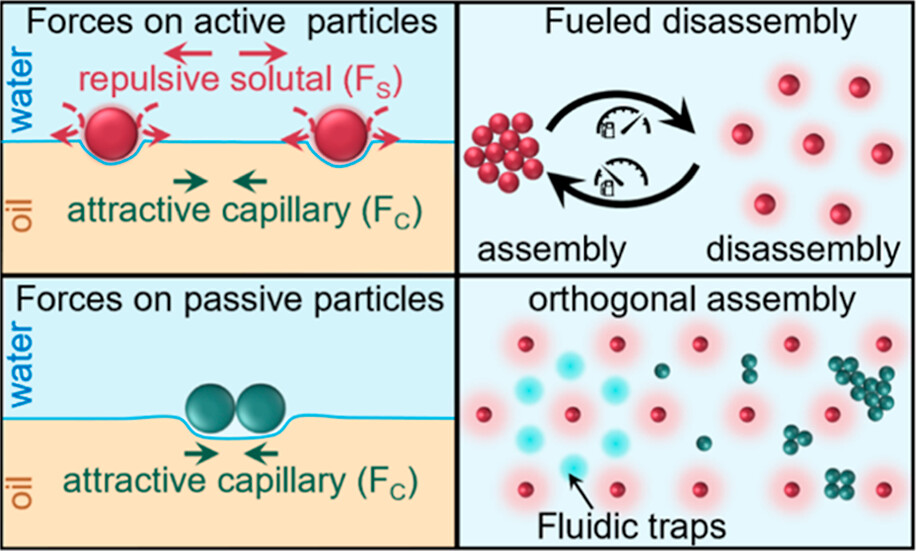4, Nov 2025
IIT Roorkee Researchers Create Life-Like Microscopic Self-Organizing Agents
Researchers from IIT Roorkee fabricate life-like microscopic agents capable of self-organization
IIT Roorkee, Uttarakhand, India, 04th November 2025: Researchers at IIT Roorkee fabricate microscopic hydrogels capable of hosting reactions within to power their self-organization at an oil-water interface. They show several life-like behaviours such as chemical fuel (food) dependence and asocial interactions with other colloids, perform microscale cargo logistics and precision colloidal assembly. Such soft microscopic robots (microbots) would play key roles in environmental remediation and targeted drug delivery. This research was spearheaded by Mr. Pankaj S. Patwal, PhD Research Scholar, under the supervision of Prof. Pavan Kumar Bosukonda and their work has been published in the Journal of the American Chemical Society (JACS), one of the world’s most prestigious scientific journals.

The study explores how model microcompartments can utilize chemical reactions hosted within to power outward fluid flow around themselves and regulate their local interactions. This enables them to produce an ordered state at the expense of chemical fuel, maintained away from equilibrium, which is a fundamental aspect of living cells. This research represents a significant step in the growing field of colloidal systems chemistry that seeks to understand how simple chemical components interact locally and produce emergent complex properties that are impossible to replicate in equilibrium conditions. These model colloids not only self-organise but can also control precisely other nearby inert microcompartments. When immobilised, they can collectively execute microscale cargo logistics and precision assembly of microcompartments to enhance chemical signaling between microcompartments.
Beyond mimicking the fundamental aspects of living systems, the findings have meaningful implications for the future. This research is a step towards next-generation intelligent materials, soft robots and artificial cells that can sense, adapt and respond to their complex surroundings. In the future, such non-toxic enzyme-powered microbots could be used in environmental remediation, such as the cleanup of oil spills, chemical sensing, or even drug delivery, where microscopic agents need to move, assemble, and act autonomously without external control.
This research resonates strongly with global scientific and policy priorities. It aligns with the United Nations Sustainable Development Goals (SDGs), particularly SDG 9 (Industry, Innovation, and Infrastructure) and SDG 12 (Responsible Consumption and Production). It is also in step with India’s strategic emphasis on strengthening the bioeconomy, enabling green technology innovation, and advancing Atmanirbhar Bharat in science and engineering. More broadly, the work contributes to the worldwide movement toward low-energy, biologically inspired technologies that are smart, sustainable, and future-ready.
Prof. Pavan Kumar Bosukonda (Supervisor) remarked, “This research advances our understanding of dynamic self-organization processes at interfaces that is a fundamental feature of living systems. The insights gained here provide a basis for developing autonomous microscale assemblies without external actuation to address challenges in environmental remediation.”
Research Scholar Mr. Pankaj S. Patwal expressed his thoughts, stating, “Our goal is to build smart materials that are capable of organizing and responding like living systems, but made entirely from simple materials.” I am grateful to my advisor, my research group, and IIT Roorkee for fostering an environment that encourages scientific curiosity and interdisciplinary exploration.”
Director, IIT Roorkee, Prof. K.K. Pant, congratulated the team and said, “This achievement reflects the strong research culture at IIT Roorkee and the Institute’s commitment to advancing frontiers in fundamental and applied sciences.”
In simple terms, this research showcases how small biomimetic systems can transiently form and organise themselves without any external trigger in the presence of the chemical fuel that mimics the fundamental behaviour of living systems. This research will provide future direction for self-operating miniature machines and help create life-like materials that is a current challenge for the scientific community. This breakthrough highlights IIT Roorkee’s growing role in shaping the future of advanced scientific research.
- 0
- By Neel Achary







